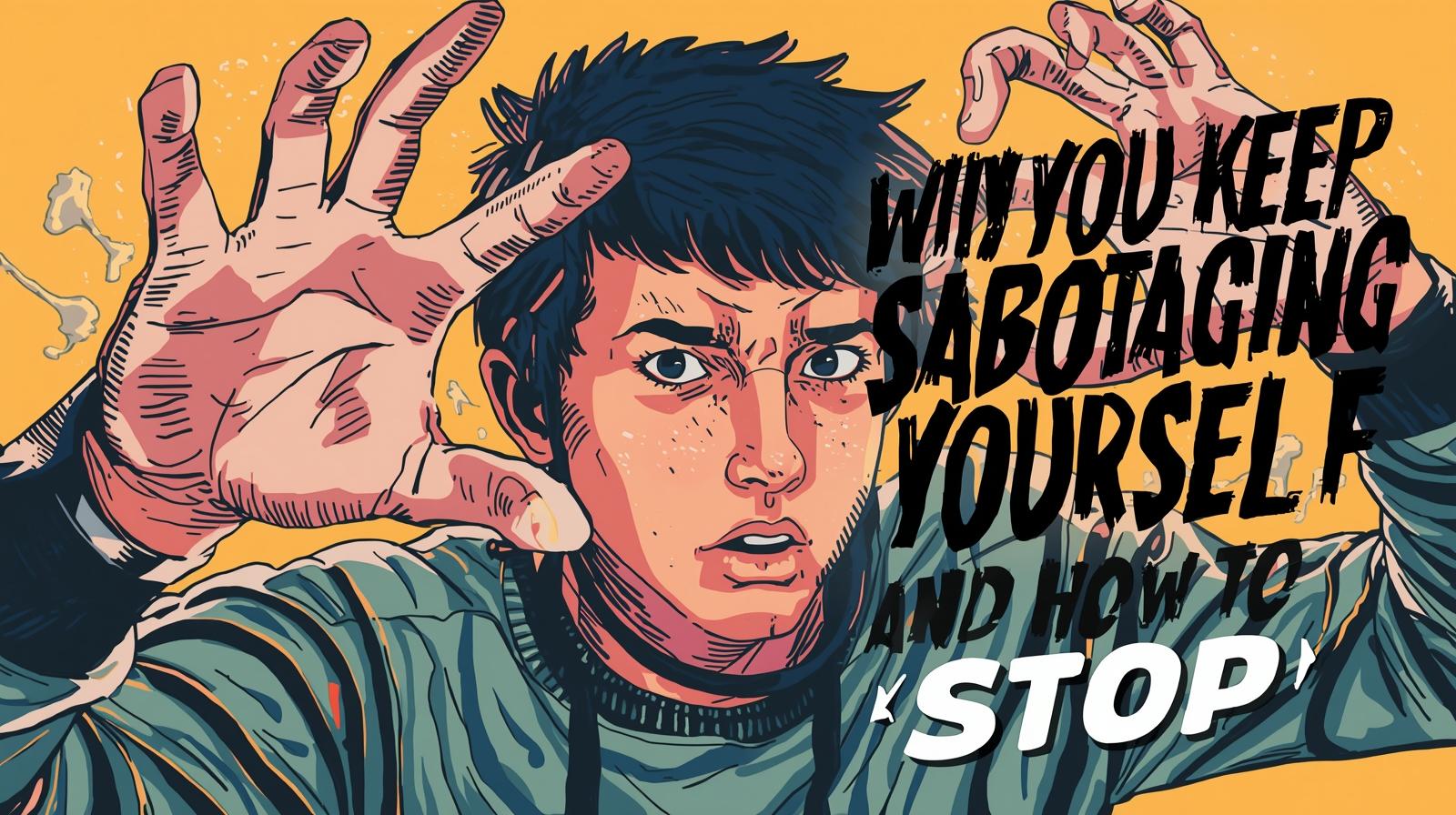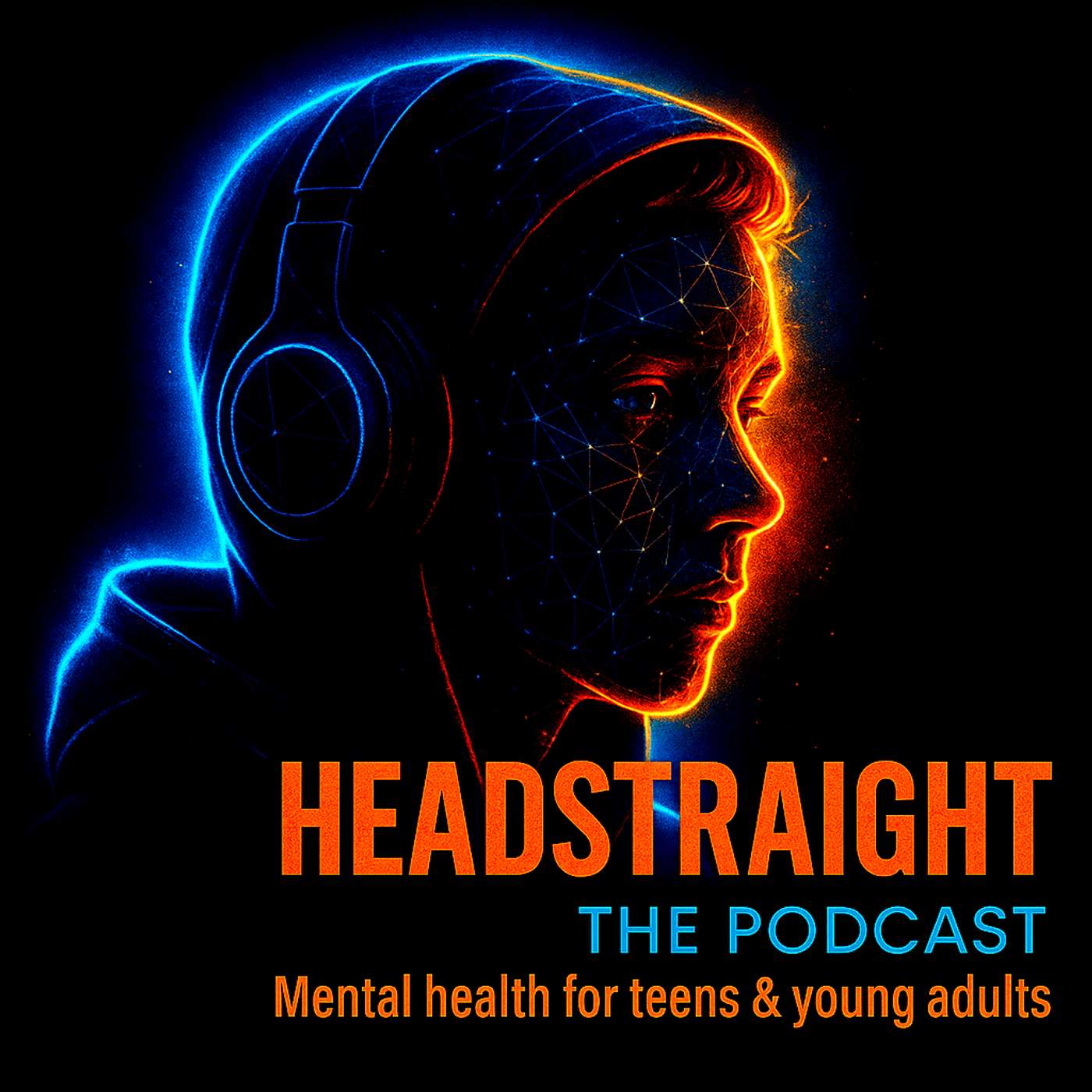Why You Keep Sabotaging Yourself (and How to Stop)

Let’s be honest for a second. We all like to blame something outside of us when things go sideways — school, stress, parents, friends, the system. But sometimes, the person quietly getting in your way isn’t any of them. It’s you.
You’ve probably had this moment: you’ve got the tools, the plan, maybe even the momentum. And then, almost out of nowhere, you ghost your own progress. You delay it. Avoid it. Blow it up. And afterwards, you sit there thinking, Why do I keep doing this to myself?
That, right there, is self-sabotage. Not because you’re weak, or lazy, or “rubbish at everything.” Sabotage is your brain trying to keep you safe — even though it ends up trapping you instead.
In this episode of Headstraight, we unpack why sabotage shows up even when you genuinely want to succeed, what sneaky short-term “wins” your brain grabs hold of, and how you can finally stop tripping yourself up.
Let’s get into it.
Want to listen on your preferred podcast app instead?
What Self-Sabotage Really Is
Here’s the first thing to understand: sabotage isn’t random destruction. It’s protection — just a very unhelpful version of it.
Think about the moments when sabotage shows up:
You sit down to revise, but suddenly the desk needs reorganising — again. You scroll TikTok looking for the “perfect study hacks,” instead of starting the actual work.
Not laziness. That’s you avoiding the fear of facing something difficult head-on.
You like someone, but instead of letting them get close, you make a joke at your own expense and pull away first.
Easier to ruin it yourself than risk being rejected.
You join the gym, buy the gear, hype yourself up… and then convince yourself everyone will stare at you when you walk in.
Avoiding the humiliation feels safer than the chance of failing.
Every one of these moments has the same message underneath:
Trying properly means you could fail properly — and failure hurts.
So your brain protects you… by stopping you.
Before you go any further, pause and be honest with yourself:
Where does this show up in your life? Where do you pull back right when you want to go forward?
The Short-Term Payoffs: Why Sabotage Feels So Tempting
Here’s the bit most people never realise: sabotage works in the short term.
Not in ways you’re proud of. Not in ways that build your future. But in the moment? It delivers.
Put off an essay until the night before? You escape today’s stress.
Walk away from a group project? You dodge the fear of criticism.
Laugh at your own idea before anyone else can? No one gets the chance to shoot it down.
And every time you get that little hit of relief — that exhale, that “phew, not today” — your brain cashes in on a short-term win.
But short-term wins come with a hidden cost:
They steal from your long-term future.
You get comfort now, at the expense of your confidence later. You escape discomfort today, but lose progress tomorrow.
So ask yourself:
What was the last sabotage move you pulled… and what tiny win did you get out of it?
The Long-Term Fear: When Success Is the Scariest Part
Sometimes sabotage isn’t about avoiding failure at all. It’s about avoiding success.
Sounds ridiculous, right? Why would anyone fear success?
Because success comes with pressure. Expectations. Visibility. Responsibility.
Success removes the excuses. Once you’ve proven you can, you can’t hide behind “I’m rubbish anyway” anymore.
So your brain cuts a deal with you:
“If I never really succeed, I’ll never have to face all of that.”
It’s not weakness — it’s a safety mechanism. A misguided one, but a powerful one.
Now ask yourself honestly:
Right now, which feels scarier — failing and staying the same, or succeeding and having everything change?
Three Tools to Break the Cycle
You’ve probably been sabotaging yourself for years. It’s okay — your brain was doing what it thought would keep you safe. But now it’s time to shift things.
Here are three tools to help you stop being your own enemy… and start being your own ally.
1. The Payoff Audit
Every sabotage moment comes with a payoff. Otherwise, you wouldn’t do it.
So next time you catch yourself about to duck out, pause and ask:
“What do I actually get out of messing this up?”
Be brutal with yourself. Be honest.
Delay coursework until the last minute?
You get to blame the deadline, not your ability.
Stay quiet in a group?
You avoid the risk of saying the wrong thing.
Tell everyone you didn’t revise before an exam?
You’ve protected your image. If you do badly, you’ve got an excuse. If you do well, you look like a genius.
When you drag those hidden wins into the light, the whole game changes.
Once you see what’s happening, the sabotage loses power.
2. The Safe-to-Succeed Plan
Most of us only plan for failure.
“What if I mess this up?”
“What if it goes wrong?”
Almost no one asks, “What if it goes right?”
That’s why success feels terrifying — because you’ve never prepared for it.
So before you start something, ask yourself:
“If this goes well, what’s the part that feels scary — and how can I make it feel safer?”
Examples:
If success makes you worry about pressure, remind yourself: one grade isn’t your whole future. It’s feedback, not a sentence.
If being seen scares you, create a grounding ritual — a deep breath, a song, or even a silly private gesture that brings you back to yourself.
If you fear responsibility, plan one way you’ll protect your downtime.
When success feels safer, you stop running from it.
3. The Future Self Check
This one is simple but powerful.
Before you sabotage, pause and ask:
“What would my future self thank me for?”
Because future-you always wants something better:
Current you: “Skip the gym.”
Future you: “Even ten minutes matters.”Current you: “Don’t send that application.”
Future you: “Send it anyway — at least you’re in the game.”Current you: “Stay quiet.”
Future you: “Speak. Even if it comes out messy.”
When you borrow courage from future-you, you stop letting scared-you run the show.
Awkwardness Isn’t Failure — It’s Growth
Here’s the side of change no one talks about: stopping sabotage doesn’t feel good at first.
It feels awkward.
You’re used to the comfort of quitting early, staying small, staying safe.
When you choose differently, your brain sounds the alarm:
“This isn’t you.”
“Stop now.”
Most people bail at this point because they mistake awkwardness for failure.
But awkwardness is proof you’re growing.
Think about it:
Riding a bike for the first time? Wobbly, clumsy — that was growth.
Saying “no” instead of people-pleasing? Guilt punched you — that was growth.
Pushing through procrastination? It felt heavy — that was growth too.
Sabotage feels safe.
Growth feels awkward.
If it feels awkward, you’re not failing — you’re winning.
Final Thoughts
Sabotage isn’t a flaw or a sign you’re broken. It’s your brain trying to protect you through comfort, escape, and excuses — but at the cost of your long-term life.
Now you’ve got three tools to start changing the pattern:
The Payoff Audit — expose the short-term wins.
The Safe-to-Succeed Plan — make success feel less scary.
The Future Self Check — borrow courage from who you’re becoming.
Change comes from doing, not just understanding. So here’s your challenge for the week:
Pick one area where you sabotage yourself.
Do a payoff audit.
Write one step to make success feel safer.
And check in with future-you before you act.
You won’t feel comfortable straight away. You’re not supposed to.
But uncomfortable is where things shift.
Next Episode: Bouncing Back When Life Hits Hard
Even when you stop sabotaging yourself, life still throws setbacks you didn’t ask for. Things fall apart. Plans collapse. You slip up. Something goes sideways.
In the next episode, we’re diving into how to bounce back from setbacks and failure — because sabotage is about the traps you set for yourself, but setbacks? Those are the moments life tests you.
And how you respond makes all the difference.
See you there.



